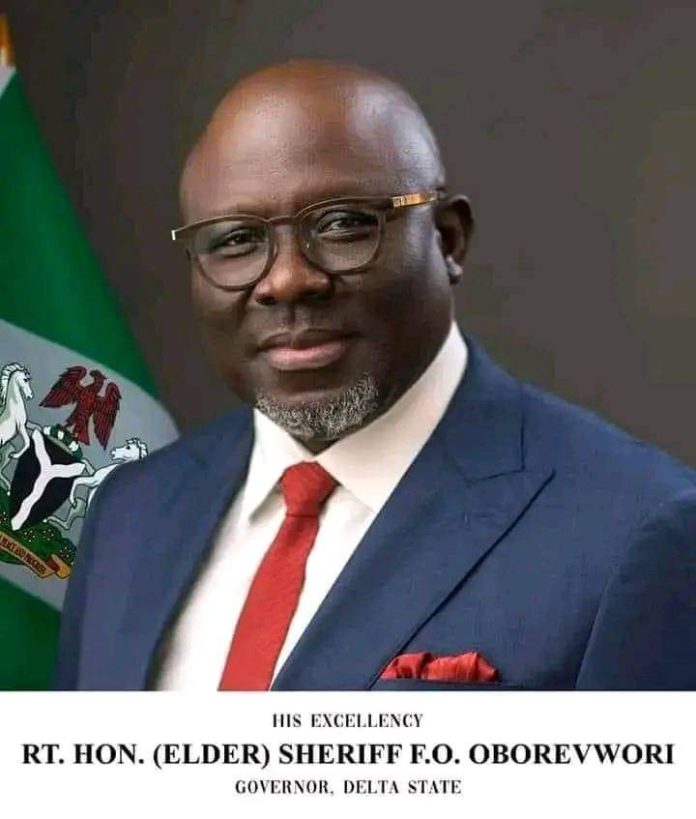BY SUNDAY EGEDE
Delta State Governor, Rt. Hon. Sheriff Oborevwori has called for innovation, sustainability and equity in the planning, financing, and execution of Nigeria’s infrastructure projects, even as he said that the state government will sustain its collaboration with the federal government in deepening infrastructural development.
Governor Oborevwori, who made the call, yesterday, during the 30th Meeting of the National Council on Works, held in Ado-Ekiti, Ekiti State, pointed out that meaningful national development can only be achieved through strong collaboration among all tiers of government and the active involvement of the private sector.
Represented at the ceremony by the State Commissioner for Works (Highways and Urban Roads), Comrade Reuben Izeze, the Governor described the annual gathering as more than a meeting of professionals and policymakers, but a reaffirmation of Nigeria’s shared resolve to build a resilient, inclusive, and sustainable infrastructure landscape.
He emphasized Delta State’s continued commitment to infrastructure as a driver of socio-economic transformation, highlighting his administration’s MORE Agenda, which prioritizes expanding rural road networks, modernizing urban infrastructure, and improving connectivity across the state.
“From the creeks and coastal communities of the Niger Delta to the vibrant urban centres of Asaba, Warri, and Ughelli, our people understand that roads, bridges, and public works are not merely physical structures; they are lifelines of opportunity, access, and unity,” Oborevwori said.
The Governor noted that his administration had upheld continuity in governance by completing inherited projects while initiating new ones that reflect the current and future aspirations of Deltans.
He commended the Federal Ministry of Works for its proactive funding prioritization, especially the continuation of NNPCL-funded projects under the Road Infrastructure Development and Refurbishment Investment Tax Credit Scheme, describing the initiative as “pragmatic, forward-looking, and essential to unlocking the full potential of Nigeria’s road network.”
Oborevwori urged the council to adopt innovative financing models that combine public investment with private capital to ensure efficiency, transparency, and value for money, just as he stressed the importance of sustainability in project design and execution.
While calling for climate-resilient and environmentally sound infrastructure adaptable to evolving needs, he also emphasized equity in infrastructure distribution, noting that all regions of Nigeria regardless of geography or population, deserve fair access to quality infrastructure that fosters growth and inclusion.
Reiterating Delta’s readiness to collaborate with the Federal Government and other states, Oborevwori assured that the state brings its experience and commitment to national efforts aimed at transforming lives and strengthening unity through infrastructure.
He expressed optimism that the 30th Council Meeting, themed “Discipline, Transparency and Innovation in Engineering Practice,” would mark a defining moment in Nigeria’s infrastructure journey.
In his remarks, the governor of the host state, Governor Biodun Oyebanji expressed delight at the convergence of professionals to exchange ideas and shape the nation’s infrastructural future, even as he affirmed Ekiti’s commitment to advancing engineering-driven economic growth through sustained investments, partnerships, and innovation.
“Engineers are the backbone of progress. Their creativity and expertise will help us build a brighter and more prosperous Nigeria,” Oyebanji stated.
The Ekiti governor thanked President Tinubu for ongoing federal interventions in state road projects and assured continued collaboration to rehabilitate other critical transport assets across the state.
In his remarks, Minister of Works, Engr. David Umahi, represented by Minister of State for Works, Bello Muhammad Goroyon commended President Bola Tinubu for his steadfast commitment to infrastructure renewal under the “Renewed Hope Agenda.”
Umahi noted that the council serves as a strategic platform to shape infrastructure policy and engineering practice nationwide, calling for discipline, transparency, and innovation in service delivery.
Delegates to the council meeting include federal and state officials, engineers, policymakers, and representatives of professional bodies such as the Council for the Regulation of Engineering in Nigeria (COREN) and the Nigerian Society of Engineers (NSE).


